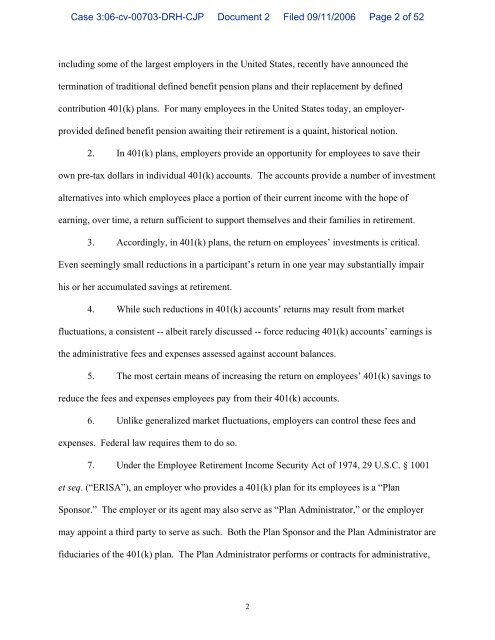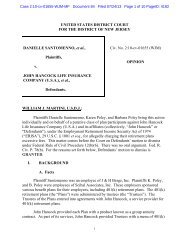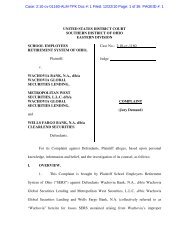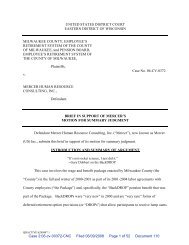International Paper - PLANSPONSOR.com
International Paper - PLANSPONSOR.com
International Paper - PLANSPONSOR.com
You also want an ePaper? Increase the reach of your titles
YUMPU automatically turns print PDFs into web optimized ePapers that Google loves.
Case 3:06-cv-00703-DRH-CJP Document 2 Filed 09/11/2006 Page 2 of 52including some of the largest employers in the United States, recently have announced thetermination of traditional defined benefit pension plans and their replacement by definedcontribution 401(k) plans. For many employees in the United States today, an employerprovideddefined benefit pension awaiting their retirement is a quaint, historical notion.2. In 401(k) plans, employers provide an opportunity for employees to save theirown pre-tax dollars in individual 401(k) accounts. The accounts provide a number of investmentalternatives into which employees place a portion of their current in<strong>com</strong>e with the hope ofearning, over time, a return sufficient to support themselves and their families in retirement.3. Accordingly, in 401(k) plans, the return on employees’ investments is critical.Even seemingly small reductions in a participant’s return in one year may substantially impairhis or her accumulated savings at retirement.4. While such reductions in 401(k) accounts’ returns may result from marketfluctuations, a consistent -- albeit rarely discussed -- force reducing 401(k) accounts’ earnings isthe administrative fees and expenses assessed against account balances.5. The most certain means of increasing the return on employees’ 401(k) savings toreduce the fees and expenses employees pay from their 401(k) accounts.6. Unlike generalized market fluctuations, employers can control these fees andexpenses. Federal law requires them to do so.7. Under the Employee Retirement In<strong>com</strong>e Security Act of 1974, 29 U.S.C. § 1001et seq. (“ERISA”), an employer who provides a 401(k) plan for its employees is a “PlanSponsor.” The employer or its agent may also serve as “Plan Administrator,” or the employermay appoint a third party to serve as such. Both the Plan Sponsor and the Plan Administrator arefiduciaries of the 401(k) plan. The Plan Administrator performs or contracts for administrative,2







